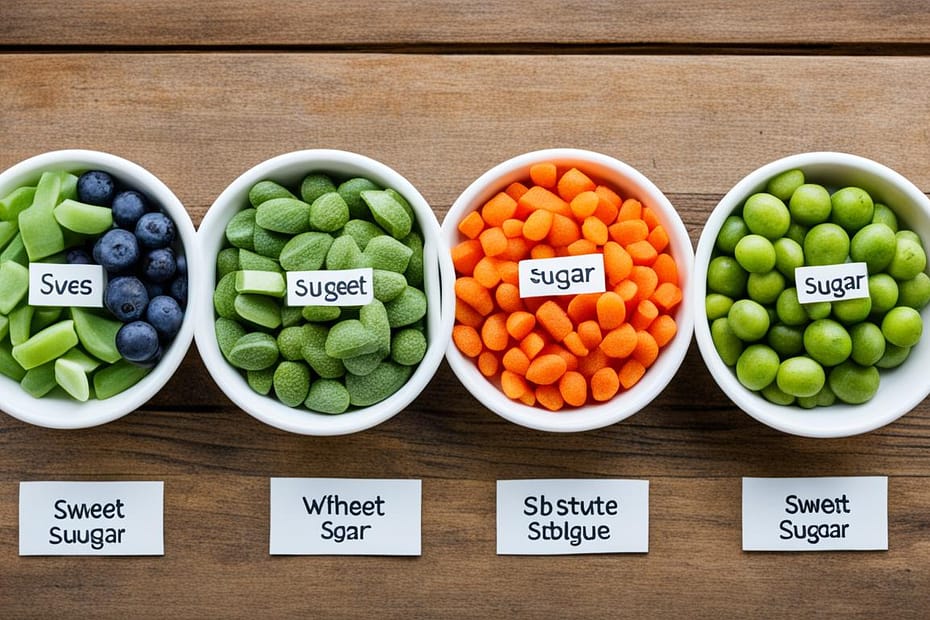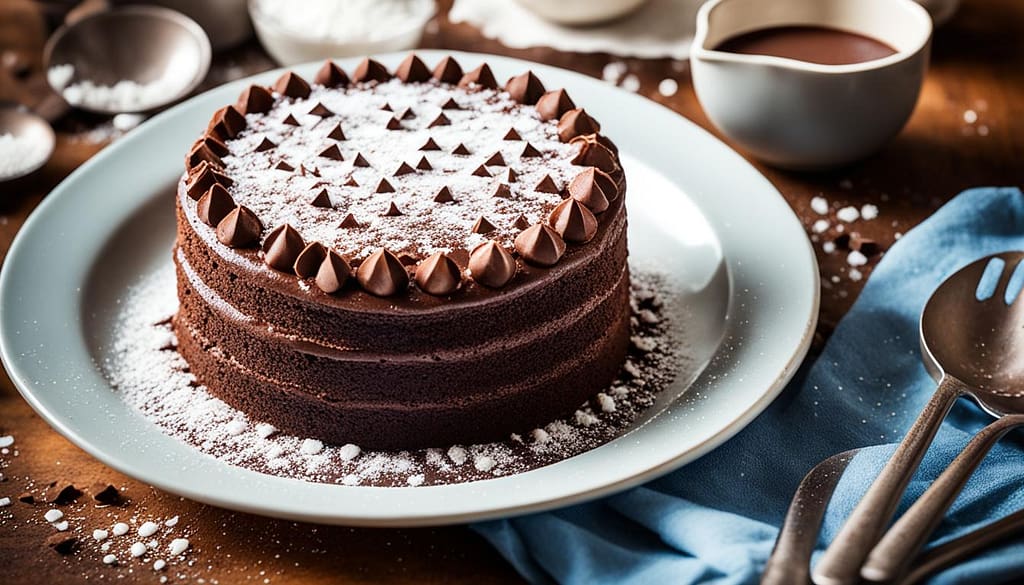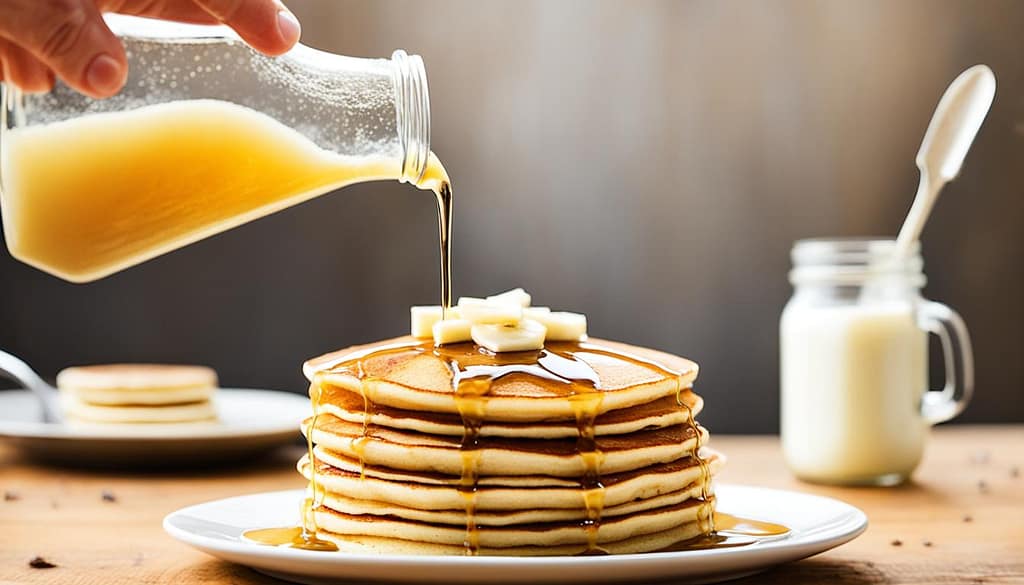Did you know that the average American consumes over 150 pounds of sugar per year? That’s equivalent to about 22 teaspoons of sugar per day! While sugar is a delicious addition to baked goods, its high caloric content and negative health effects have led many people to seek out alternative sweeteners for their favorite treats. Luckily, there are several sweet sugar substitutes that can provide the same level of sweetness without the guilt. In this article, I will introduce you to five natural sweeteners that are perfect for baking, allowing you to enjoy tasty and healthier desserts.
Key Takeaways:
- Reducing sugar intake is essential for maintaining a healthy diet.
- Stevia, erythritol, monk fruit sweetener, coconut sugar, honey, agave nectar, and maple syrup are excellent alternatives to traditional sugar.
- These sweeteners can be used in a 1:1 ratio as a substitute for sugar in baking.
- Each sweet sugar substitute has its unique flavors and characteristics, allowing for versatility in baking.
- By incorporating these alternatives, you can enjoy delicious and guilt-free desserts.
Stevia – A Natural Sweetener for Baking
When it comes to finding a natural sweetener for your baking needs, stevia is an excellent choice. Derived from the Stevia rebaudiana plant, stevia is a natural sweetener that has gained popularity in recent years. Not only does it provide a delicious sweetness to your baked goods, but it also offers several health benefits.
One of the key advantages of baking with stevia is its zero-calorie content. This makes it a fantastic option for those looking to reduce their sugar intake or maintain a healthy lifestyle. Stevia also doesn’t have any impact on blood sugar levels, making it an ideal choice for individuals with diabetes or those following a sugar-free diet.
Stevia is available in powdered and liquid forms, providing versatility in your baking recipes. The powdered form is perfect for measuring out the desired amount, while the liquid form offers convenience and ease of use. It’s essential to note that stevia is significantly sweeter than sugar, so a little goes a long way. Start with a small quantity and adjust according to your desired level of sweetness.
By incorporating stevia into your baking, you can enjoy the same level of sweetness as sugar without the extra calories or detrimental effects on your health. Whether you’re making cookies, cakes, or muffins, stevia can be a fantastic substitute that will satisfy your sweet tooth.
Baking with Stevia Tips:
- Start with a small amount, as stevia is much sweeter than sugar.
- Refer to a conversion chart to guide you on the appropriate measurement for your recipe.
- Experiment with different brands and forms of stevia to find your preferred taste.
- Combine stevia with other natural sweeteners like erythritol or monk fruit sweetener for a well-rounded flavor.
- Adjust the quantity of other ingredients, such as liquids or fats, to maintain the desired consistency of your baked goods.
With its natural sweetness, zero-calorie content, and versatility in recipes, stevia is a top choice for those seeking a healthy sugar substitute in their baking endeavors. Embrace the wonderful qualities of stevia and create delicious, guilt-free treats that satisfy your cravings and support your wellbeing.
Erythritol – A Low-Calorie Sugar Substitute for Baking
Erythritol is a fantastic low-calorie alternative to sugar that is perfect for baking. It is a sugar alcohol that occurs naturally in certain fruits and fermented foods, making it a healthier choice for those looking to reduce their caloric intake while still enjoying sweet treats. Erythritol provides the same level of sweetness as sugar and can be used in a 1:1 ratio, making it an easy substitution in your favorite recipes.
One of the major benefits of erythritol is that it has a minimal impact on blood sugar levels. This makes it an ideal choice for individuals with diabetes or those following a low-carb diet. Additionally, erythritol is well-tolerated by most people and does not cause the digestive issues that other sugar alcohols can sometimes trigger.
Another unique characteristic of erythritol is its cooling effect when consumed. This cooling sensation can be a pleasant surprise in baked goods, adding an interesting twist to the overall flavor experience. Whether you’re making cookies, cakes, or muffins, erythritol can provide the sweet taste you crave while helping you maintain a healthier lifestyle.
Erythritol is a versatile sweetener that adds delicious flavor to baked goods while keeping calorie counts low. Its minimal impact on blood sugar levels makes it a great choice for those with diabetes or anyone looking to cut back on sugar consumption. So go ahead and experiment with erythritol in your baking – your taste buds and waistline will thank you!
Comparison of Nutritional Values: Sugar vs. Erythritol
| Sugar (1 Cup) | Erythritol (1 Cup) | |
|---|---|---|
| Calories | 774 | 0 |
| Carbohydrates | 200g | 100g |
| Fat | 0g | 0g |
| Sugar | 200g | 0g |
| Protein | 0g | 0g |
As you can see from the comparison table, erythritol is a low-calorie alternative to sugar, containing zero calories and no fat. It also doesn’t contribute any sugar or protein to your baked goods. This makes erythritol an excellent choice for those looking to reduce their calorie and sugar intake without sacrificing the taste and texture of their favorite treats.
So why not give erythritol a try in your next baking endeavor? It’s a versatile and healthy sugar substitute that will satisfy your sweet tooth while keeping you on track with your dietary goals.
Monk Fruit Sweetener – A Natural Sugar Substitute with Zero Calories
When it comes to finding a natural sugar substitute for baking, monk fruit sweetener is a top contender. Derived from the monk fruit, also known as Luo Han Guo, this sweetener provides a similar level of sweetness to sugar without the calories or impact on blood sugar levels. Monk fruit sweetener is available in both granulated and powdered forms, making it versatile for various baking recipes.
Unlike some other sweeteners, monk fruit sweetener doesn’t have a bitter aftertaste, making it an excellent choice for those who prefer a clean and satisfying sweetness. It also blends well with other ingredients and preserves the texture and taste of baked goods.
One of the advantages of monk fruit sweetener is its zero calorie content. This makes it a great option for individuals looking to reduce their sugar intake while still enjoying their favorite baked treats. Whether you’re following a specific diet or simply seeking healthier alternatives, monk fruit sweetener can be an excellent addition to your pantry.
The Benefits of Monk Fruit Sweetener:
- Provides a similar level of sweetness as sugar
- Zero calories
- No impact on blood sugar levels
- No bitter aftertaste
- Blends well with other ingredients
With its natural sweetness and health benefits, monk fruit sweetener offers a guilt-free way to satisfy your sweet tooth. So why not give it a try in your next baking adventure?
“Monk fruit sweetener provides a similar level of sweetness to sugar without the calories or impact on blood sugar levels. It is an excellent choice for those who prefer a clean and satisfying sweetness.” – Me
| Monk Fruit Sweetener vs. Traditional Sugar | ||
|---|---|---|
| Attribute | Monk Fruit Sweetener | Traditional Sugar |
| Sweetness | Similar to sugar | Sweet |
| Calorie Content | Zero calories | 16 calories per teaspoon |
| Impact on Blood Sugar | No impact | Raises blood sugar levels |
| Bitter Aftertaste | No | No |
| Texture and Taste Preservation | Yes | Yes |
Coconut Sugar – A Natural Substitute with a Unique Flavor
When it comes to finding a natural sweetener with a distinct flavor for your baking needs, look no further than coconut sugar. Made from the sap of coconut palm flowers, this alternative sweetener offers a rich, caramel-like taste that adds depth and complexity to your favorite baked goods.
Coconut sugar shares a similar texture and appearance to brown sugar, making it an easy 1:1 substitute in your recipes. It’s a great option for those looking for a healthier alternative as it is considered to have a lower glycemic index than regular sugar. This means that it has a slower impact on blood sugar levels, making it a favorable choice for individuals who are mindful of their sugar intake.
But the benefits of coconut sugar don’t stop there. It also contains trace amounts of nutrients like iron, zinc, and potassium, giving it some added nutritional value compared to refined sugar. So not only does coconut sugar provide a unique flavor profile, but it also offers some natural goodness.
If you’re ready to give your baking a tropical twist and enjoy the health benefits of this natural sweetener, try substituting coconut sugar in your favorite recipes. Whether you’re making cookies, cakes, or muffins, coconut sugar can add a delightful flavor and a touch of natural sweetness to elevate your creations.
Coconut Sugar Nutrition:
| Per 100g | Amount |
|---|---|
| Calories | 375 |
| Total Carbohydrate | 92g |
| Sugar | 75g |
| Protein | 0g |
| Total Fat | 1g |
| Saturated Fat | 0g |
| Trans Fat | 0g |
| Cholesterol | 0mg |
| Sodium | 15mg |
| Potassium | 730mg |
| Iron | 2mg |
Honey – A Natural Sweetener with Complex Flavors
Honey has been a beloved natural sweetener in baking and cooking for centuries. Produced by bees from the nectar of flowers, honey comes in a variety of flavors and colors, depending on the source of the nectar. Its unique depth and complexity of flavor make it a perfect addition to your baked goods.
When using honey as a sugar substitute, the general rule of thumb is to use ¾ cup of honey for every cup of sugar called for in a recipe. However, it’s important to note that honey contains moisture, so you need to reduce the amount of liquid in the recipe to account for this added moisture.
Experimenting with different types of honey can add a delightful twist to your baked goods. Each variety has its own distinct flavor profile, ranging from light and floral to rich and bold. Consider trying wildflower honey, clover honey, or even more unique varieties like buckwheat honey or lavender honey.
“Honey’s complex flavors can truly elevate your baked goods to the next level.”
Benefits of Using Honey in Baking
- Honey adds natural sweetness to your recipes without the need for processed sugar.
- It provides a natural source of antioxidants and nutrients.
- Honey can help retain moisture in baked goods, resulting in a moist and tender texture.
- The unique flavors of honey can enhance the taste of your desserts, creating a more complex and satisfying experience.
| Honey Variety | Flavor Profile | Best Pairings |
|---|---|---|
| Wildflower Honey | Delicate, floral, and slightly fruity | Lighter baked goods like muffins and scones |
| Clover Honey | Mild, sweet, and buttery | Breads, granola bars, and cookies |
| Buckwheat Honey | Robust, earthy, and malty | Dark chocolate desserts, gingerbread, and strong-flavored cakes |
| Lavender Honey | Fragrant, floral, and slightly herbal | Shortbread cookies, tea cakes, and berry desserts |
As you can see, honey’s complex flavors can truly elevate your baked goods to the next level. So go ahead and explore the world of honey, experiment with different varieties, and enjoy the natural sweetness it brings to your favorite recipes.
Agave Nectar – A Natural Liquid Sweetener for Baking
Agave nectar, derived from the native Mexican agave plant, is a liquid sweetener that can be used as a substitute for sugar in baking. With a consistency similar to honey, agave nectar offers a milder flavor compared to its sweeter counterpart. It is an excellent choice for recipes where you want to avoid an overpowering sweetness. However, it is important to note that agave nectar is high in fructose, so it should be used in moderation, particularly for individuals with diabetes or those watching their sugar intake.
When using agave nectar as a sugar substitute in baking, it is advisable to reduce the amount of liquid in the recipe by approximately ¼ cup for every cup of agave used. This adjustment helps maintain the desired consistency of the baked goods.
The Benefits of Agave Nectar as a Sugar Substitute
Agave nectar offers several advantages as a baking sweetener:
- Alternative to sugar: Agave nectar provides an alternative to traditional sugar while adding sweetness to your favorite baked treats.
- Liquid sweetener: Agave nectar’s liquid form makes it easy to incorporate into your recipes.
- Mild flavor: With its milder taste, agave nectar offers a subtler sweetness that complements a variety of baked goods.
- Smooth texture: Agave nectar blends smoothly with other ingredients, ensuring a consistent texture in your baked treats.
Overall, agave nectar is a natural and versatile liquid sweetener that adds a touch of sweetness to your baking creations. When used responsibly and in moderation, it can be a satisfying substitute for refined sugar.
Expert Tip: Exploring the Flavors of Agave Nectar
If you want to experiment with different flavors, look for flavored agave nectars such as vanilla or cinnamon. These varieties can add an extra element of taste to your baked goods.
Remember to taste and adjust as needed when using agave nectar in your recipes. As with any sweetener, it is best to start with a smaller amount and gradually add more to suit your individual preferences.
Maple Syrup – A Natural Substitute with Distinctive Flavor
When it comes to sweet sugar substitutes for baking, maple syrup is a delicious and natural option. Made from the sap of maple trees, this syrup boasts a distinct flavor that adds a rich, caramel-like sweetness to your favorite baked goods.
Using maple syrup as a sugar substitute in baking requires making a slight adjustment in your recipe. For every cup of syrup used, you’ll need to reduce the amount of liquid in the recipe by approximately ¼ cup. This helps account for the additional moisture present in the syrup.
Maple syrup truly shines in recipes that can benefit from its unique taste profile. Think fluffy pancakes, golden waffles, and moist muffins. Its natural sweetness and rich flavor make it the perfect addition to these breakfast favorites.
Try this delicious pancake recipe with maple syrup:
“Light and fluffy maple syrup pancakes”
- Whisk together 1 cup of all-purpose flour, 2 tablespoons of granulated sugar, 1 teaspoon of baking powder, and a pinch of salt in a large bowl.
- In a separate bowl, combine ¾ cup of buttermilk, ¼ cup of milk, 2 tablespoons of melted butter, 1 large egg, and 2 tablespoons of pure maple syrup.
- Pour the wet ingredients into the dry ingredients and stir until just combined. Be careful not to overmix.
- Heat a non-stick skillet or griddle over medium heat and lightly grease it with cooking spray or butter.
- Pour ¼ cup of the pancake batter onto the skillet for each pancake. Cook until bubbles form on the surface, then flip and cook for an additional 1-2 minutes.
- Stack the pancakes on a plate and serve hot with a drizzle of maple syrup.
Remember to choose 100% pure maple syrup rather than the artificially flavored pancake syrup, which often contains added sugars and artificial additives.
So, if you’re looking for a natural and flavorful alternative to sugar in your baking, give maple syrup a try. Its distinctive taste and versatility will take your baked goods to the next level of deliciousness.
Conclusion
In conclusion, there are several sweet sugar substitutes for baking that provide a healthier alternative to traditional sugar. These natural sweeteners, such as stevia, erythritol, monk fruit sweetener, coconut sugar, honey, agave nectar, and maple syrup, offer a variety of options to suit different tastes and dietary preferences.
By using these sweet sugar substitutes for baking, you can enjoy delicious desserts and baked goods without the negative effects of excessive sugar consumption. These low-calorie sweeteners and alternative baking sweeteners can be used in a 1:1 ratio as a substitute for sugar, making them convenient and easy to incorporate into your recipes.
Whether you are looking for natural sweeteners or exploring healthy sugar substitutes, these options provide a range of flavors and characteristics that add depth and complexity to your baked goods. From the intense sweetness of stevia to the rich caramel-like taste of coconut sugar and maple syrup, there is a sugar-free baking option for every preference.
By experimenting with these sweet sugar substitutes for baking, you can create a wide variety of desserts that cater to different dietary needs while still satisfying your sweet tooth. So, next time you reach for the sugar in your baking, consider trying one of these alternatives for a delicious and healthier option.
FAQ
What are some sweet sugar substitutes for baking?
Is stevia a good sugar substitute for baking?
Can erythritol be used as a low-calorie sugar substitute for baking?
What is monk fruit sweetener and can it be used for baking?
Can coconut sugar be used as a sugar substitute in baking?
Is honey a good natural sweetener for baking?
Can agave nectar be used as a liquid sweetener for baking?
Can maple syrup be used as a natural sugar substitute in baking?
Source Links
- https://www.self.com/gallery/sugar-substitutes-baking-diabetes
- https://www.biggerbolderbaking.com/sugar-substitutes-guide/
- https://www.hersheyland.com/stories/6-sweet-sugar-substitutes-for-baking.html


